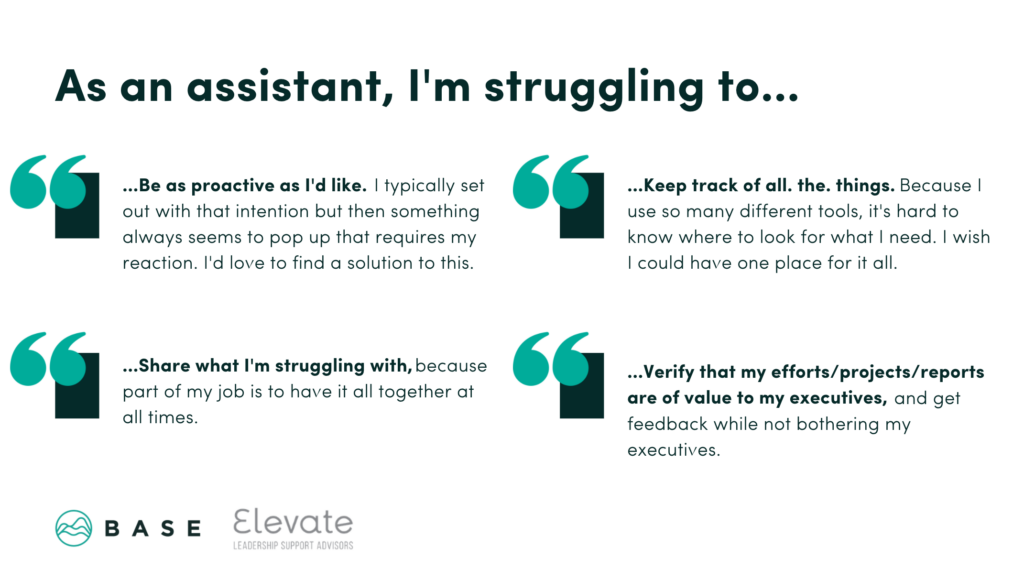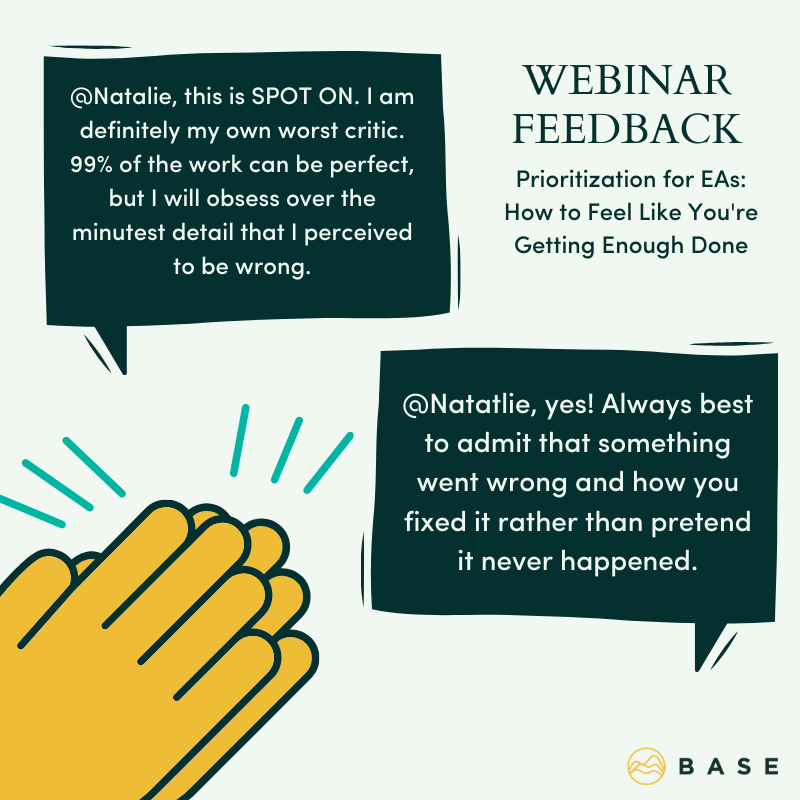Feeling overwhelmed? Like you can’t get it all done or catch up? You’re not alone.

We partnered with Elevate on a webinar, “Prioritization for EAs: How to Feel Like You’re Getting Enough Done…And Actually Get It All Done” (Watch the full webinar here.) Our CEO Paige McPheely and her EA Natalie Turner talked candidly about the struggles executive assistants and administrative professionals have with staying on top of, well, everything!
Paige and Natalie shared how they have:
- Combatted managing multiple inboxes
- Streamlined communication streams
- Organized deadlines and decisions so nothing slips through the cracks
- Set expectations
- Established both personal and business goals, and methods of working towards each them
Here is some of the feedback from webinar from attendees:

We weren’t able to address everyone’s questions during the webinar, so we’ve answered them here! See attendee questions and Paige and Natalie’s responses below.
ATTENDEE: I find as an EA it can be difficult to set goals or KPIs, because they often are tied directly to the exec. Any thoughts or goals that [you] use to measure performance?
NATALIE: While it’s tough to measure out specific KPIs, it’s important to know that goal-setting is where these KPIs for YOUR role and the executive you support start to form. Here is a 5-Step Goal Planning Method for Assistants as a place to start.
PAIGE: “[Take] initiative, even if you don’t know where to start. You likely know more than you think you do so draft what you believe your goals and objectives to be and present them to your exec for feedback and dialogue.
What if you work for executives who want little to no involvement or communication? [And] they want you to work autonomously to get your work done, in order to allow them to focus on their work and meetings? How do you change their mindset to show there is value in weekly or bi-weekly check-ins to ensure we are on the same page?
PAIGE: Starting with a regular daily or weekly digest is crucial. As an assistant, you’re already sending updates/important information over to executives (whether or not they are already a super-involved exec), and so showing you’re able to provide that information in a clear, concise, and consistent manner changes the whole dialogue. Regular, scheduled digests help set a precedent for how you work together: transparently and successfully. Establishing this foundation opens the door for “time” on your exec’s calendar to have regular 1:1’s. And remember this is YOUR time to own!
Regarding check-ins and 1:1s, given the current climate, I’m hesitant to recommend assistants demand a specific meeting cadence; however, I have found that a weekly meeting cadence tends to work best. At a minimum, I believe it should be a requirement to have at least bi-weekly check-ins with your exec. Regardless of the cadence, I’m hopeful that many executives would respond well to their assistant clearly defining a communication protocol that they’ve designed to match both of their needs.
Regarding being proactive in making decisions and “knowing the next question to ask”: “What if I don’t know what to ask? [Is there] a good default question?”
NATALIE: Know how to diagnose a problem. Come with a level of preparedness, even when it’s a struggle. The key thing is knowing that you will never have ALL the answers, but knowing how to strategically look at a situation, take the data you have, and provide intelligently-backed options is crucial to excelling. A question I ask myself often is, “what else?” This helps you observe what those next questions are and could be.
PAIGE: Yes [to Natalie’s response]! Try to also put yourself in your executive’s shoes. Pretend you’re preparing for a big meeting, or a big trip, etc. What might you need to know/have in order to feel ready to win? I believe empathy is pretty important with this step, too. The good news is that this will get easier with time. You’ll start to recognize patterns in the “next questions” as you begin to more deeply understand how your executive processes information.
How can we train our executives to be more compassionate towards us (the way we are trying to do ourselves?)
NATALIE: This starts with looking at your relationship with your executive as a relationship you’re building and how you can be a support to a person—versus, “how can I get through this list of tasks my executive wants me to do?” Establishing expectations and goals is a huge part of this, too.
PAIGE: Yes! The less transactional the relationship can be, the better. If you start getting the hang of asking the next question, your exec will start to rely on you more…and likely open up to you more.
I also think it’s a great idea to regularly share feedback on what went well and what should be done differently moving forward (about your exec and about you). This process can often provide a safe place to communicate your needs. A good time to have this dialogue would be during your 1:1.
Watch the full webinar here.
